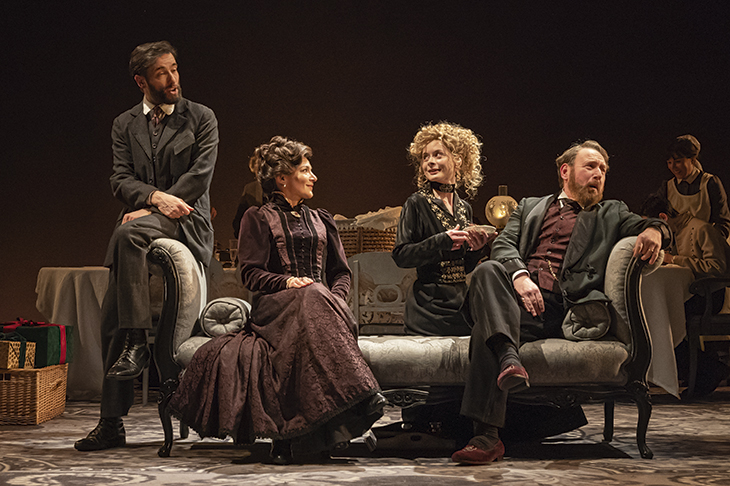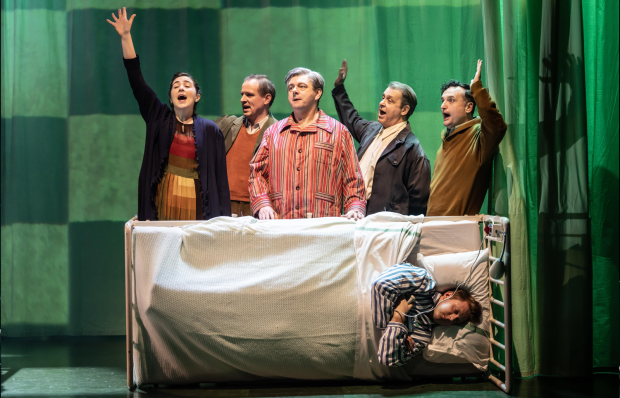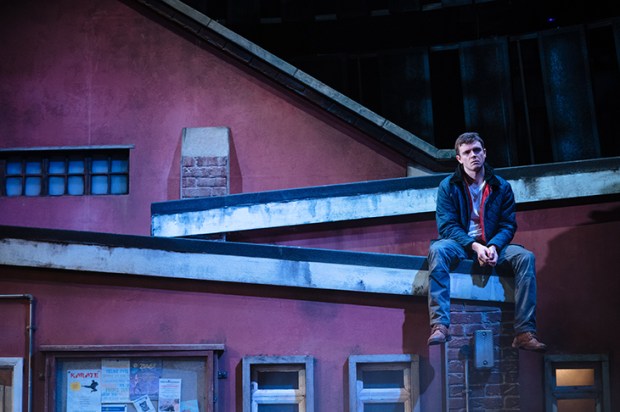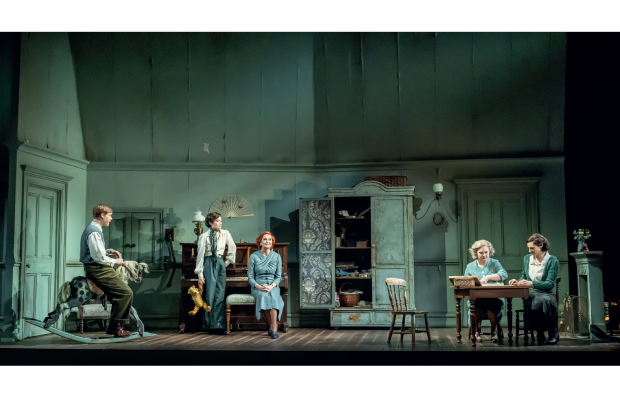History will record Leopoldstadt as Tom Stoppard’s Schindler’s List. His brilliant tragic-comic play opens in the Jewish quarter of Vienna in 1899. We meet a family of intellectuals and businessmen who are celebrating their very first Christmas. The eldest son, Hermann, has married a Catholic and become ‘Christianised’ in order to smooth his path through Austrian society. ‘The Jews know a bargain when they see it.’ The family are amusingly puzzled by the distinction between ‘papist’ and ‘Protestant’ and they’re also keen to honour their ancient traditions. This generates plenty of foreskin gags. (‘Are we on or off with the circumcision?’)
At press night, the critics were busy scribbling one-liners which are destined to reach the dictionary of quotations. ‘Why do Jews have to choose between pushy and humble?’ ‘Today’s modern is tomorrow’s nostalgia: we missed Mahler when we heard Schoenberg.’
The scene moves to 1924 where the younger generation are planning their futures in a mood of innocent optimism which the audience watches with foreboding. Another jump to 1938 shows the family being evicted by a creepy Gestapo officer who punctiliously obliges Hermann to initial a certificate assigning all his wealth to the German state. Thanks to an ingenious plot twist the validity of Hermann’s signature comes into question. The final scene, in 1955, shows the survivors meeting after the war. Included is a grandson who escaped to England and now works as a comic novelist. (Stoppard’s self-portrait, of course.) The character is named Leo Chamberlain. Why? Perhaps a homage to the Briton who declared war on Hitler.
This play is a vast undertaking, artistically and commercially, and it won’t make much profit because the 40-strong company is exceptionally large. Revivals are unlikely to follow for the same reason. The queue will be enormous. Join it and be glad.
Death of England is a brand new state-of-the-nation drama co-written by Roy Williams and the director, Clint Dyer. It features a handful of roles, all played by Rafe Spall. The central figure is a cockney geezer, Michael, whose dad is a florist. Michael mingles easily with people of all ethnicities and he’s particularly fond of Caribbean grub. Dad, by contrast, is a virulent bigot who questions Raheem Sterling’s performances in an England shirt. ‘Lack of confidence?’ suggests Michael. ‘Lack of fucking Englishness,’ corrects Dad. Michael’s mum is also an embittered and mouthy racist.
At some point in this muddled script the liberal-minded Michael starts to morph into his parents and to rant about ‘fucking Brexit’ and his fear of cultural collapse. His opinions ring false. ‘Flakes of shit desperately trying to hang on,’ is his description of the English. ‘Only thing we’re good at is smashing things up.’ This is classic Islington, of course, a shuddering distaste for the violent proles. But putting ‘Islington’ in the mouth of a make-believe Cockney won’t fool anyone — except Islington.
The script doesn’t tell us where Michael lives but a stray reference to Repton Boxing Club places the action near Brick Lane. The multiethnic population of this inner-city quarter includes very few far-right racists like Michael whose views are commoner further east, beyond Dagenham and Ilford, in the outer suburbs. Most Londoners know this. The writers don’t. A sense of political topography is essential to the credibility of a play like this.
When Dad kicks the bucket, Michael has a complete meltdown. So does the script. At the funeral, Michael is approached by an Asian restaurant worker, Riz. ‘His large brown eyes are hurt but resilient,’ notes Michael with a Book At Bedtime flourish. Riz reveals that Dad had a hidden intellectual side. The room above Riz’s restaurant operated as a literary salon where Dad used to expand his horizons by reading English authors like George Eliot and Salman Rushdie. Riz encouraged these studies.
Seriously? The script wants us to believe that an Asian waiter would run a private book club where local bigots could explore the alternative Koranic theology as set out in the Satanic Verses. It gets crazier still. Michael asks why none of Dad’s mates noticed he was a regular at Riz’s seat of learning? The answer is that Riz observed a rather odd timetable. The book club was closed during the day and its doors were open only in the pre-dawn hours, between 4 and 6.30 a.m., which gave Dad a chance to enjoy a stint of heavy reading in the middle of the night before opening up his flower stall in time for the morning rush hour. I doubt if such a barmy device has ever been used to mend a broken script.
This painful and embarrassing show is further marred by its straitened emotional range. Spall has only two modes, snarling fury and a frenetic chumminess that is tiresome rather than charming. I’ve watched a lot of hokum at the National since my first visit in 1979. Nothing was this bad.
Got something to add? Join the discussion and comment below.
Get 10 issues for just $10
Subscribe to The Spectator Australia today for the next 10 magazine issues, plus full online access, for just $10.
You might disagree with half of it, but you’ll enjoy reading all of it. Try your first month for free, then just $2 a week for the remainder of your first year.














Comments
Don't miss out
Join the conversation with other Spectator Australia readers. Subscribe to leave a comment.
SUBSCRIBEAlready a subscriber? Log in